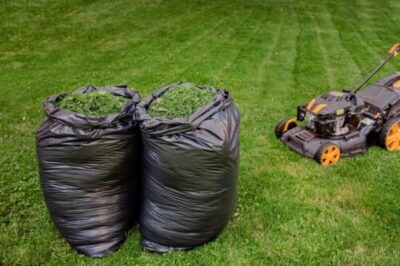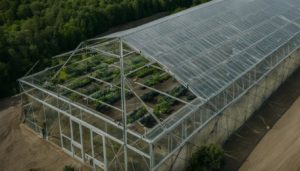You want a beautiful lawn, and you are wondering, is it better to mulch or bag grass clippings? This article will tell you all you need to know.
Disclosure: This article may contain affiliate links – that means we may receive a commission if you make a purchase after clicking on these links. This is at no extra cost to you.
Mulching is typically better than bagging your grass clippings. The cut grass left on the lawn provides food and moisture. There are times you will want to bag the clippings.
If you want a healthy green lawn, you need to know how to care for it properly. Here we will discuss why mulching is better and when you should bag those clippings.
Why is Mulching Better for Your Grass?
As mulched grass clippings break down, they deposit nutrients into the soil and provide moisture. It is best to mow your lawn with a mulching mower more often and not let the grass grow too high.
It is best to use a lawnmower with mulching and bagging capabilities. When mulching, be sure to use a sharp mower blade.
Did you know that grass is 85% water?
Using a mulching mower and leaving the clippings provides added moisture to the soil. The mulch also provides nutrients such as:
- Phosphorus is found in all the cells of the grass. It helps the grass produce food and energy and plays a vital role in photosynthesis that gives grass its green color. It is important because “Its functions cannot be performed by any other nutrient.”
- Nitrogen: Grass needs nitrogen to make amino acids. This produces healthy growth of the plant. However, you want just the right amount of nitrogen.
Too little nitrogen, and the lawn will not grow properly. Too much, and the roots will not form correctly. In excessive amounts, it can cause the poisoning of animals, such as rabbits, that eat grass.
- Potassium is vital for the grass to be drought tolerant and utilize water proficiently. This makes the grass green and healthy.
By mulching the grass, you are providing your lawn with natural fertilizer. Natural is typically a much better way to feed your lawn than buying expensive chemical fertilizers.
When Should You Bag Your Grass?
You should always bag your grass clippings if your lawn is diseased. It is also a good idea to bag the grass clippings when you have leaf litter and when the grass is tall.
There are times when bagging your grass is going to help keep your lawn healthier than if you mulch it.
For example, if your lawn is diseased in many areas, you do not want to spread that to other parts of your yard. In this case, you will need to bag the clippings and discard them in a proper manner.
If you have trees shedding leaves, you will also want to bag the clippings. This is so your lawn receives enough sunlight and can breathe. This is also why you do not want to mulch tall grass.
When mowing tall grass, it is difficult for the blades of the mower to cut the grass blades small enough to be used for mulch—leaving tall clippings of grass on your lawn results in what is called thatch.
Thatch is a layer of dead plant matter that lies in a thick mat between the soil and the grass. It is caused when there is too much yard debris left on the grass. Thatch can starve the lawn of water and nutrients.
How Do I Discard Diseased Grass Clippings?
When mowing diseased grass or near diseased plants, catch the grass in the provided mower bag.
You should then compost this material completely.
Depending on the laws in your town, you might be able to discard the clippings in the green waste cans.
It is important not to spread disease to other parts of your grass and yard.
Therefore you will want to collect the clippings and turn them into compost or put them in your green waste cans to let the city turn it into usable compost.
Can I Compost Tall Grass and Leaf Litter?
It is possible to compost tall grass and leaf litter, and it is recommended to do so together. This is because thatch takes a long time to break down by itself; adding leaves speeds the process up.
By collecting your long grass clippings, thatch and leaves from the trees you can create compost. Compost is a nutrient-rich dirt, and can be used in gardens. To compost tall grass and leaf litter:
- Collect the yard clippings and leaves by mowing with a bagged mower.
- Discard the yard waste in a designated compost area or in a compost bin.
- Add to the compost pile with fruit and vegetable matter from your kitchen, including coffee grounds.
- Stir your compost often and keep it moist.
You can also add compost worms like red wigglers to help speed the process up.
Mulching or Bagging Grass Clippings Can Benefit Your Lawn
In this article we looked at; is it better to mulch or bag grass clippings? In conclusion, it is usually best to mulch your lawn clippings directly while you mow your lawn.
This provides your lawn with natural nutrition that will keep it healthy and green.
However, the bagged clippings can be composted with other vegetation matter into a nutrient-rich dirt that can be used throughout your yard and garden.


